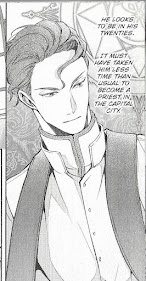The Other World's Books Depend on the Bean Counter provides the hero, Seiichirou, with multiple dating options. The trope is typical of yaoi and shojo and doesn't automatically denote a romantic triangle. The main couple's mutual attachment is never truly at risk.
The Other World stands out, however, because the choices are distinct and insightful as foils to the main relationship.
The Prime Minister
 The Prime Minister thinks like Seiichirou. They both have matter-of-fact and logical minds. So when a villain in the second light novel apologizes, Seiichirou's response is, "So?" Both he and the prime minister then proceed to list all the laws that the man broke, from attempted murder to treason. (I guess your emotional response is nice for you--you're still going to jail.)
The Prime Minister thinks like Seiichirou. They both have matter-of-fact and logical minds. So when a villain in the second light novel apologizes, Seiichirou's response is, "So?" Both he and the prime minister then proceed to list all the laws that the man broke, from attempted murder to treason. (I guess your emotional response is nice for you--you're still going to jail.)
With the Prime Minister as a romantic partner, Seiichirou would be even more of a workaholic than he already is. And some of the less kindly and ruthless aspects of his personality would come to the fore. In any case, Seiichirou sees the man as an ally, not a potential partner.
Seigvold
Seigvold, the priest, idealizes Seiichirou, to the point of capitalizing his role: "But you are a disciple, Disciple." Seiichirou finds being propped up on a pedestal extremely discomforting. He is aware of the man's adoration but places it firmly in the category of religious fervor. He admires Seigvold but doesn't entirely comprehend him.
Interestingly enough, Seigvold's attitude here leads to one of the moments when the Holy Maiden, from our world, and Seiichirou, from our world, respond in common. They are both thoroughly modern in their acceptance of pluralism re: religion despite the gap in age and Seiichirou's occasional irritation at her immaturity. They surprise the people around them who operate in a type of eighteenth-to-nineteenth-century British culture with a related mindset: Yes, there are other religions, and they are sort of accepted, and sure, most people mostly go to church for rites of passage as opposed to regular services, but there is a state church...so why are we talking about other belief systems?
Yua, the Holy Maiden, and Seiichirou take other belief systems for granted.
The idea of two people sharing a common value system comes up a number of times. (See below.)
Aresh
Aresh, of course, is Seiichirou's lover. Despite the gap in age (8 years) and occupation (soldier and accountant), they get along. A passage in the second light novel underscores the reason:Aresh...walked over to Seiichorou's side, sidestepping the monk.
"You're late," [Aresh stated].
"Am I?"
Their words were brief, but both the monk and Selio were astonished by the closeness between the two men. The scene was familiar to anyone from the royal palace, but it certainly was astonishing to anyone seeing it for the first time.
The link between Seiichirou and Aresh is temperament. Seiichirou is shrewd, even canny, and able to see multiple sides of an issue though tunnel-visioned about everything else. He is dry-witted, possibly more than he realizes (Aresh refers to him at one point as "snarky"). He has a cool head under most circumstances. For an honest man, he has an unnerving gift for prevarication and is incredibly diffident, traits he is only beginning to lose with Aresh.
Aresh is reserved except with select people. He is brave and somewhat impulsive but not unwisely. At 22, he still has a desire to impress his lover. He is romantic. He is also versatile and willing to adapt. He found his life before Seiichirou rather samey and pointless. He revels in having a purpose in life. He is the type who, once committed, is absolutely committed.
The two men's temperaments mesh. They communicate easily and they communicate on the same wavelength--most of the time.
Values
An issue that is raised in both light novels and in the manga volumes is the issue of values. Seiichirou is thoroughly modern and unapologetic about the fact. He recognizes that the world he has come to has its own history and viewpoints but he also believes that differing mental frameworks (as those between aristocrats and commoners) may prevent people from entirely leaping the gap.One of the most insightful parts of the second light novel occurs when Seiichirou is asked to explain why the Holy Maiden doesn't want to stay. He waffles (why is it his problem?) but he also recognizes that values play a huge role:
After all, if someone were to tell a high school girl from his home world, "I want your child as a backup plan, so become my wife," Seiichirou knew they would be cut down with a single word: "Gross."
Even Aresh and Seiichirou have differing values, which Seiichirou attempts to point out almost from the beginning. In the second light novel, Seiichirou is embarrassed that the servants want to celebrate he and Aresh getting together romantically (not just as a way to save Seiichirou's life). To him, the inclusion of the servants means "other people know!"
But to Aresh, the servants--whom he treats well and who look after him--are extensions of himself, much like Darcy's household, for Elizabeth, is an extension of his personality.
Seiichirou recognizes the difference in assumptions. His objectivity (in part due to age) and his (slow) willingness to adapt (to some things) help the relationship...as does Aresh's willingness to listen and to adapt. Aresh is also quite good at choosing his battles: Seiichirou's opinions on finances belong in Seiichirou's sphere while Seiichirou's tendency to overwork himself is Aresh's problem and he has the right to interfere.
Very smart writing!
Comparison to Lars to come!



